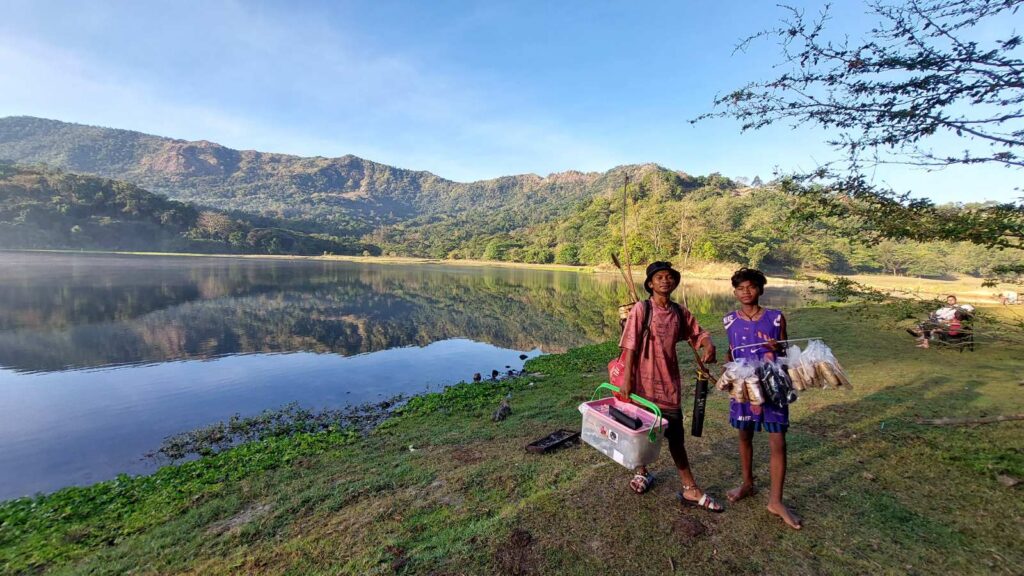Lake Mapanuepe and the Aetas’ journey to education

Lake Mapanuepe
SAN MARCELINO, Zambales — Bird-shaped flutes made of bamboo that can blow up multiple sound like birds are being sold by 14-year-old Aeta Earn to visitors at Lake Mapanuepe.
The small stick at the bottom controls the amount of air in the whistle and is moved up and down to make changes to the pitch, ideal for being loud and imitating birds.
Earn told me that he walked almost a day from their home in Pinatubo to Lake Mapanuepe to sell souvenirs made from bamboo like the flutes, penholders, bows and arrows so that he can save for his education as he wanted to be a policeman someday.
Earn’s story reminded me of “Black Rainbow,” a film about the journey of a 12-year-old Aeta in Porac, Pampanga for his education that bagged major awards in last year’s Cinemalaya Independent Film Festival.
Zig Dulay’s “Black Rainbow” won best film, best screenplay and the NETPAC award in the short film category.
“Black Rainbow” is a tale about an Aeta who dreams that the first step to a better life is through education. He chases his dream of going to school to learn how to read the legal documents given to their community and to understand why they are being forced to give up their ancestral lands to give way for mining.
The citation read: “for being a bright jewel of a short film, for being a cross-cultural masterpiece that touches the heart and reveals the universality of family, and community and the determination of children to pursue their bright young dreams,”
Dulay stressed in his speech the value of storytelling: “It is not about how long or short, or how many films you have created, but how wide your audience is, how deep the mark of the film gives to the audience, including its relevance, meaning, and purpose, and the goal to give a voice to those seldom heard and give a platform to the marginalized especially to the indigenous people (IP) community”.
In 2017, the video of Norman King as the first Aeta to graduate from University of the Philippines Manila became viral. He marched up to the stage as a bare-chested man in traditional Aeta garb to receive his diploma on B.A. Behavioral Science. His diploma is a story of struggle filled with discrimination, poverty, and natural calamities.
King’s mother reminds him that he owes his growth to all the hardships he has faced, that a man who has fallen and risen is someone who commands respect and honor.
An interesting scene in “Black Rainbow” was the chanting over the hills for Apo Namalyari to guide him on his quest for education.
Apo Namalyari is the supreme god and great provider of the Aeta people who have a strong spiritual connection with him. They consider Mount Pinatubo as sacred for it is said to be Apo Namalyari’s abode. It was believed that the drilling operations for geothermal power was the cause of Apo Namalyari’s fatal wrath that he made the volcano erupt.
More than thirty years ago, on June 15, 1991, the eruption of Mt. Pinatubo was considered the world’s largest volcanic eruption that buried the region in ash.
Bursts of gas-charged magma exploded into umbrella ash clouds, hot flows of gas and ash descended the volcano’s flanks and lahars swept down valleys.
Water from intense rainfall mixed with loose volcanic materials created dangerous and destructive mudflows called lahars. It resulted in loss of lives and damage to properties in areas surrounding the volcano affecting more than 1.3 million people in 39 different towns and four large cities.
With an area of 670 hectares, Lake Mapanuepe is a freshwater lake in Zambales that was formed from the Mt. Pinatubo explosion.
The lahars blocked all exit points of water going down the Mapanuepe Valley in Barangay Aglao and Barangay Buhawen as well as the river. As a result, the rising waters submerged the Mapanuepe Valley and Lake Mapanuepe came into existence. All structures in the two barangays were submerged during the violent eruption and only the sunken Buhawen church’s huge metal cross can be seen in the middle of the lake.
It is a four-hour drive from Manila, which is easilymaccessible through the North Luzon Expressway (NLEX) and Subic-Clark Tarlac Expressway (SCTEX). Be ready for a bumpy, rough road trail going there through a vast area of lahar and river streams crossing.
It is a perfect place for photoshoots, videography, and communing with mother nature.
Many visitors describe the lakeside as strikingly close to the idyllic New Zealand greenery countryside with its colors of nature – hills, lush open fields, flocks of birds, towering pine trees with cows, carabaos, horses and goats grazing on patches of grass. The mountain is even reflected in the lake.
You need to bring your own camping tent and food if you want to stay overnight as there are no hotels or resorts and no restaurants in the area.
(Peyups is the moniker of University of the Philippines. Atty. Dennis R. Gorecho heads the seafarers’ division of the Sapalo Velez Bundang Bulilan law offices. For comments, e-mail info@sapalovelez.com, or call 09175025808 or 09088665786.)
The post Lake Mapanuepe and the Aetas’ journey to education appeared first on Cebu Daily News.

No comments: